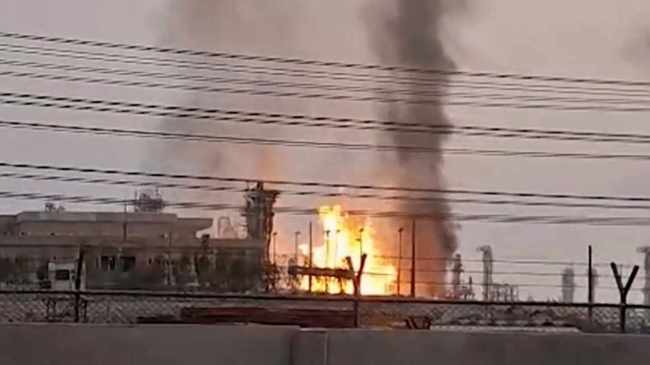Opinion Israel’s attack on Iran shows that preemptive war is the new norm
What we are witnessing today is a creative reinterpretation of self-defence to include psychic anticipation
 The global community must push for a re-centring of international law, the reaffirmation of proportionality, and the rebuilding of multilateral mechanisms(Photo: IRIB via AP)
The global community must push for a re-centring of international law, the reaffirmation of proportionality, and the rebuilding of multilateral mechanisms(Photo: IRIB via AP) The global order is undergoing a chilling transformation. The doctrine of deterrence, once rooted in mutual survival and carefully calibrated escalation, is being replaced by a dangerous new principle: Pre-emptive strike. This shift, subtle at first and now unapologetically explicit, is not merely tactical — it is doctrinal. It alters the moral and legal foundations of international relations. Fear — real, perceived, or imagined — has become the legitimate currency of violence. The result is not stability, but sanctioned chaos, where the burden of innocence lies increasingly on the attacked, not the attacker.
Consider the latest Israeli strikes on Iran, reportedly in response to perceived preparations for future assaults. No formal war declaration, no Security Council authorisation, no definitive intelligence shared. Just a unilateral act based on the attacker’s internal calculus of risk. The rules of war have evolved into rules of fear.
The seeds of this shift were sown not in Tehran or Tel Aviv, but in Washington. In 2003, the United States invaded Iraq under the doctrine of “preventive war” — a war to avert a future war, based on suspicion of weapons of mass destruction that never materialised. That war, illegal under international law, went largely unpunished.
Instead of global outrage translating into new checks, what we saw was doctrinal mimicry. Powerful nations saw the precedent: You could act unilaterally, claim existential anxiety, and still escape consequences. What mattered was not whether the enemy could strike, but whether you felt they might. The 2003 Iraq invasion normalised the idea that one’s fears could justify another’s funeral.
Today, we are witnessing the full flowering of that idea. Pre-emptive war without clear evidence became politically survivable and strategically useful. Russia invoked similar logic in Ukraine: It claimed Kyiv posed a NATO-enabled existential threat.
Similarly, the attack on Iran by Israel is not about countering aggression, but neutralising “attackability” — a vague, elastic term that permits force against mere potential. The doctrine now asserts: If I fear you may attack, I have the right to attack you — even if my fear is unfounded. Even if you are unarmed. Even if it’s me who has historically attacked you.
The philosophical underpinnings of this shift are important to unpack. Fear, in the classical realist tradition, has always been acknowledged in international relations. But until now, fear was a constraint — the reason you didn’t strike, because you feared retaliation, escalation, mutual loss. But in the current framework, fear is now a weapon. Not fear of retaliation, but fear of vulnerability.
Nowhere is this clearer than in Gaza. Thousands of civilians have died, entire neighbourhoods reduced to rubble, basic infrastructure obliterated — not because of an imminent attack from each house, but because those homes are in a zone perceived as “attackable.”
In Iran, the same logic holds. There is no evidence yet publicly offered that Iran was about to launch a direct attack. Yet the strike was carried out as a “message,” a pre-emptive move, a symbolic severing of possibility. The attacker need not show an imminent threat, only say they “felt” it.
This doctrine of pre-emptive fear has completely collapsed the architecture of international law. The UN Charter only allows self-defence in the event of an actual armed attack. What we are witnessing today is a creative reinterpretation of self-defence to include psychic anticipation.
Worse still, this doctrine is now being executed without accountability. There is no international forum strong enough to demand evidence, no consensus to condemn violations, and no will to protect the principle of proportionality. The Security Council is paralysed. The ICJ is ignored. International humanitarian law, once considered a bulwark against indiscriminate violence, is treated as optional fine print.
Even worse, the doctrine is racialised. Who gets to be afraid, and whose fear is validated? Western powers and their allies can invoke fear and be understood; others who fear occupation, surveillance, and annihilation are labelled irrational, extremist, or terror-prone. The global system is asymmetrical — not just in military strength, but in who gets to narrate their fears as legitimate.
For smaller nations, this signals a new vulnerability. They can now be attacked not for what they’ve done, but for what they could be imagined to do. This permanently destabilises their sovereignty. For nuclear powers, it incentivises first-use logic and blurs the red lines that prevented previous world wars. For civilians caught in conflict zones, it means a life lived under drones, not because they are threats, but because they live near perceived ones.
The doctrine of pre-emptive strikes does not end war. It ensures war is continuous, perpetual, and unaccountable. It does not build peace. It builds fear-fed legitimacy for power.
The global community must push for a re-centring of international law, the reaffirmation of proportionality, and the rebuilding of multilateral mechanisms. If we fail to do so, we will continue down a path where security is bought through slaughter, and where war is not the failure of diplomacy, but the first choice of power.
Ambassador Manav Sachdeva is a former United Nations official and international affairs expert. He writes on conflict, power, and ethics in global governance. He currently serves as Global Goodwill Ambassador for President Zelenskyy’s Office




